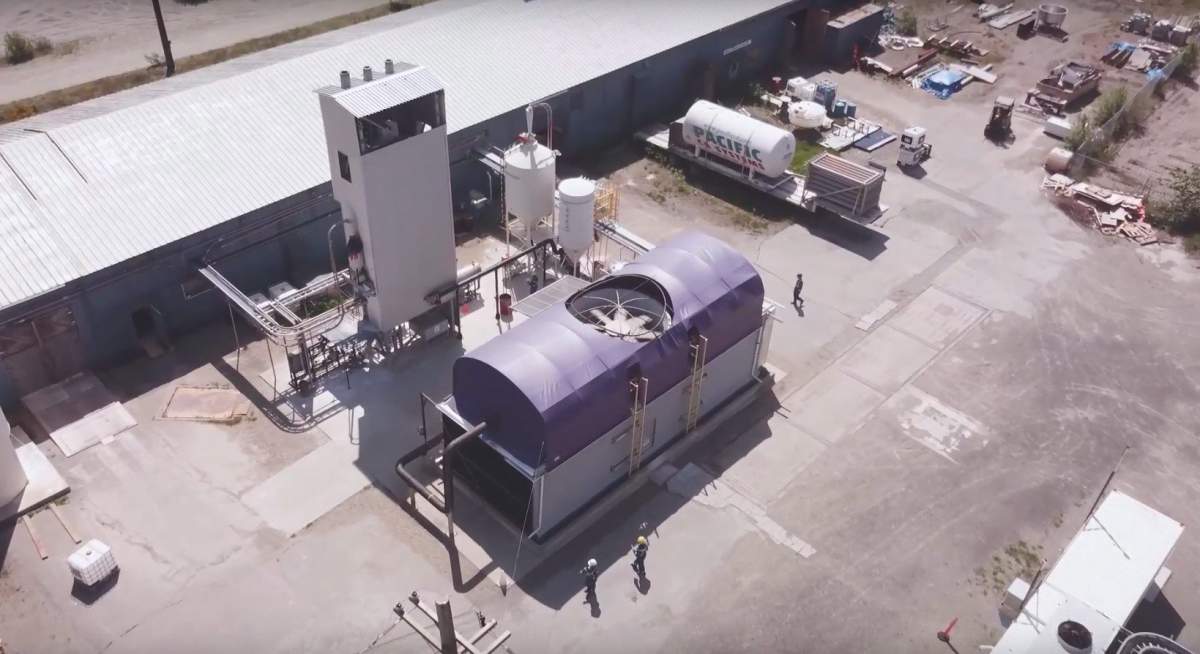While it sounds like the makings of science fiction, one Canadian startup believes it’s figured out a way to suck carbon dioxide from the air and convert it into fuel for cars, trucks, buses, etc. – and to top it off, it’s all cost-effective.

It may sound too good to be true, but in a jointly-published study by Harvard University researchers and the Squamish, B.C.-based company Carbon Engineering, researchers claim that a method called direct air capture can do exactly that. However, Carbon Engineering claims to be able to get the job done at a third of the cost of competitors working on similar technology.
“Yes, we’re absolutely confident,” Steve Oldham, of Carbon Engineering, told Global News reporter Ted Chernecki. “I don’t just believe it, I know it. This is based upon an existing facility. This is not a PowerPoint calculation. It’s a real facility. We’ve done real testing. We’re using real equipment from real suppliers that we’ve talked to,” Oldham added.
The business model works by adding hydrogen to the captured CO2 to produce a liquid fuel, which is already being produced in small quantities.
WATCH: NDP criticizes government on its climate change efforts

“We’re going to make a completely clean gas. That gasoline or diesel of jet fuel will work with any existing vehicle,” Oldham said. He added that this method not only solves the problem of converting the transportation industry to clean fuels, but it does so using the cars, buses, jets, etc., that are already on the road.
WATCH: ‘Climate change is not elitist’: Liberals respond to carbon tax critics

At least seven companies around the world are working on similar technologies, including the Swiss-based Climeworks, who has already built a commercial-scale plant. However, none of Carbon Engineering’s competitors are able to deploy this technology at the same low price point of between US$94 and US$232.

Get breaking National news
In comparison, it costs Climeworks approximately US$600 a tonne to remove carbon from the atmosphere. Another estimate for the process, published in the Proceedings of the National Academies, estimated the cost to be more than US$1,000.
The reason Carbon Engineering is able to capture CO2 from the air at such a low cost, it claims, is because of the company’s use of technology and components that are well understood and commercially available. Oldham told Global News that an example of this can be found in the front end of the system – the component that actually pulls the CO2 out of the air – which uses membranes from the air cooler industry, often found in water coolers.
“Until now, research suggested it would cost US$600 per ton to remove CO2 from the atmosphere using DAC technology, making it too expensive to be a feasible solution to removing legacy carbon at scale. At CE, we’ve been working on direct air capture since 2009, running our pilot plant since 2015, and we now have the data and engineering to prove that DAC can achieve costs below US$100 per ton. No prior research in the peer-reviewed literature provides a design and engineering cost for a complete DAC system– and this paper fills that gap,” said Harvard applied physics professor and lead author on the study, David Keith.
Carbon Engineering currently pulls about one tonne of carbon a day from the air and produces two barrels of fuel. Oldham says that since its components are “off the rack,” it should be easy to scale up.
As a feature of the Paris climate agreements, leaders from around the world agreed to try to keep global warming within a two-degree limit, though fears have been raised that climate emissions won’t be cut fast enough.
One of the great benefits of making fuel from air is energy independence, Oldham told CKNW’s Jon McComb Show.
“I think it’s a fantastic opportunity. It provides fuel independence. We only need water, and sunlight and air to produce fuel. And that means you can locate your fuel plant wherever you have those three things – lots of places,” he said.
Carbon Engineering’s plan isn’t foolproof though. Carbon Engineering’s fuel costs about 25 per cent more than gasoline made from oil. Oldham said work is being done to reduce that.
— With a file from the Canadian Press
- B.C. First Nation opposes cull on its territory after footage of ‘Judas’ wolf
- Tumbler Ridge students won’t ‘return to current school site’ after mass shooting
- Tumbler Ridge school shooting suspect was ‘hunting,’ RCMP says
- They ‘ran into gunfire’: Impact of the Tumbler Ridge shooting on first responders









Comments
Want to discuss? Please read our Commenting Policy first.